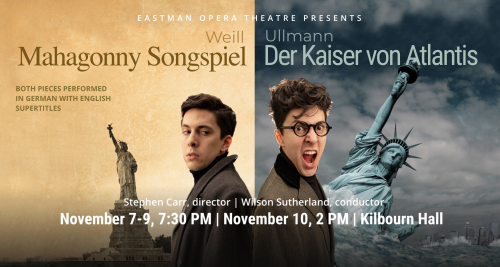Media only:
Public Relations and Social Media Coordinator Katey Padden, (585- 274-1052, kpadden@esm.rochester.edu)
Eastman Opera Theatre is thrilled to launch its season with the double-bill premiere of Der Kaiser von Atlantis and Mahagonny Songspiel in Kilbourn Hall, November 7-10. This double-bill will be directed by Stephen Carr, Associate Artistic Director of Eastman Opera Theatre with musical direction by Wilson Southerland, Assistant Music Director of Eastman Opera Theatre. Both pieces are relatively brief, with a cast of just six performers, and the same actors will perform both titles. With a modern interpretation that focuses on the hot-button topic of immigration, these two lesser-known operas are a unique opportunity for Rochester audiences.
these two lesser-known operas are a unique opportunity for Rochester audiences.
“These two thought-provoking, rarely performed works should prove to be an extremely engaging double-bill for our audiences,” shares Stephen Carr, Associate Professor of Opera and Musical Theatre, and Associate Artistic Director of Eastman Opera Theatre (EOT). “Paired together in this way, the works pose some provocative questions about capitalist excess and the dehumanization of fascism.”
Der Kaiser von Atlantis was written by Viktor Ullmann and Peter Kien while the two men were interned in the Nazi concentration camp of Theresienstadt, but it was never performed in the camp. Mahagonny Songspiel was the first collaboration of Kurt Weill and Bertolt Brecht, an artistic partnership that proved to be one of the most influential of the century.
The two short operas’ mordant humor and jaundiced view of humanity have a contemporary moral and political resonance. In Der Kaiser von Atlantis (The Emperor of Atlantis, or Death Abdicates, 1943) the mad, murderous Emperor, ruler of much of the world, proclaims universal war and declares that his old ally, Death will lead the campaign. Death, offended by the Emperor’s presumption, breaks his sabre and announces his abdication: henceforth, people will never die. Confusion and misery result, as male and female soldiers from opposite sides sing a love duet instead of fighting, and the sick and suffering find no release. Death offers to return on one condition: that the Emperor is the first to die. He accepts, and sings his farewell.
In Weill and Brecht’s Mahagonny Songspiel (1927), there is no dialogue or character development, but the songs tell a simple story, set in the imaginary country of Mahagonny, where all vices and excesses – money, sex, alcohol – are encouraged. Mahagonny attracts many visitors, but they are quickly disillusioned by their “anything goes” lives. God orders them all to go to Hell, but they protest and revolt, claiming they are there already.
Wilson Southerland will be doing pre-performance talks one hour before each performance in the Ray Wright Room (room 120), located at 26 Gibbs street on the first floor of the main building at Eastman School of Music.
Tickets are on sale now with $24 General Admission. $10 student tickets available. Tickets can be purchased at the Eastman Theatre Box Office, 26 Gibbs St.; by phone (585) 274-3000; or online at http://eastmantheatre.org
# # #
About Eastman Opera Theatre:
Eastman Opera Theatre offers a comprehensive program of training and performance opportunities. Many Eastman graduates, like distinguished alumni Renée Fleming, Anthony Dean Griffey, Julia Bullock, Erin Morley, and Nicole Cabell, enter the operatic profession as a natural extension of this experience.
A minimum of three productions are mounted yearly, each within a different-sized performance venue at the Eastman School, including the recently renovated 2300 seat Kodak Hall at Eastman Theatre, the 450-seat Kilbourn Hall, and the 75-seat Opera Studio. Productions feature a wide range of musical styles, most are performed in the original language, and depending on the venue, many use full orchestral accompaniment. Studio productions, scenes programs, and outreach events are also presented to further enhance the variety of performance experience. Eastman Opera Theatre utilizes a “class and degree blind” approach to casting, meaning that roles go to the singer with the best audition, starting their Junior year in school and with the approval of their studio voice teacher. Most of our productions feature a mix of upper class undergraduates (juniors and seniors), masters, and doctoral students.
Recent and past productions include Bellini’s I Capuleti e i Montecchi; Mozart’s Cosi fan tutte, Le nozze di Figaro, and Don Giovanni; Donizetti’s L’elisir d’amore; Puccini’s La Rondine and La Bohème; Britten’s A Midsummer Night’s Dream and Albert Herring; Kander and Ebb’s Cabaret; Sondheim’s A Little Night Music, Sweeney Todd, and Assassins;Floyd’s Susannah; Handel’s Xerxes and Orlando; Rossini’s Il Turco in Italia; Ravel’s L’enfant et les sortilèges; Bock’s She Loves Me; Poulenc’s Dialogues of the Carmelites; Lehár’s The Merry Widow and Weill’s Street Scene; Monteverdi’s L’Incoronazione di Poppea; Glass’s Hydrogen Jukebox and Les Enfants Terribles; Guettel’s The Light in the Piazza; and Gordon’s Tibetan Book of the Dead.
About Eastman School of Music:
The Eastman School of Music was founded in 1921 by industrialist and philanthropist George Eastman (1854-1932), founder of Eastman Kodak Company. It was the first professional school of the University of Rochester. Mr. Eastman’s dream was that his school would provide a broad education in the liberal arts as well as superb musical training. The current dean is Jamal Rossi, appointed in 2014.
More than 900 students are enrolled in the Collegiate Division of the Eastman School of Music—about 500 undergraduates and 400 graduate students. They come from almost every state, and approximately 23 percent are from other countries. They are taught by a faculty comprised of more than 130 highly regarded performers, composers, conductors, scholars, and educators. They are Pulitzer Prize winners, Grammy winners, Emmy Winners, Guggenheim Fellows, ASCAP Award recipients, published authors, recording artists, and acclaimed musicians who have performed in the world’s greatest concert halls. Each year, Eastman’s students, faculty members, and guest artists present more than 900 concerts to the Rochester community.

